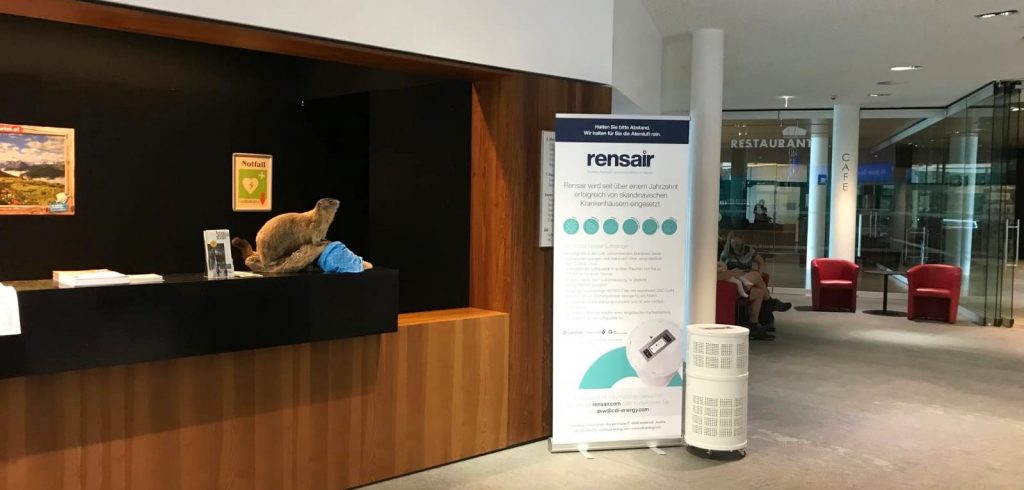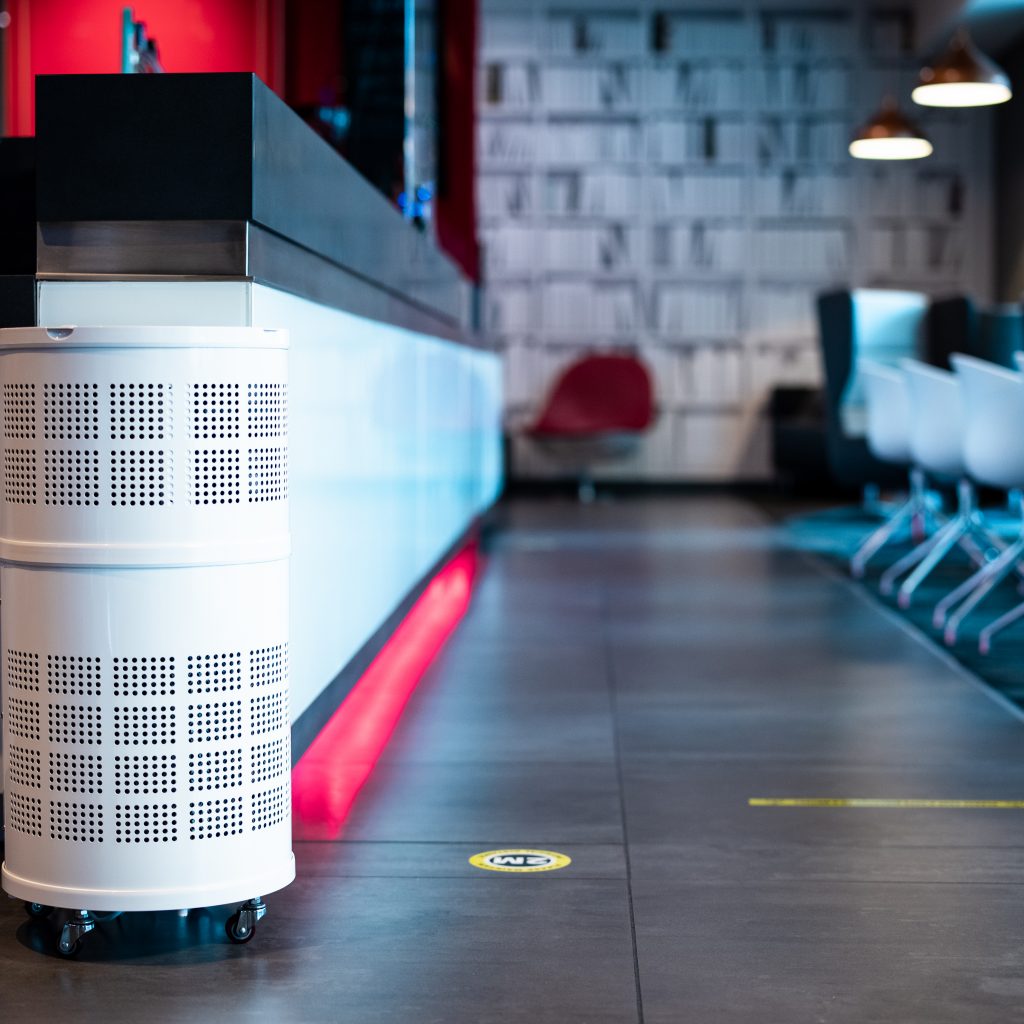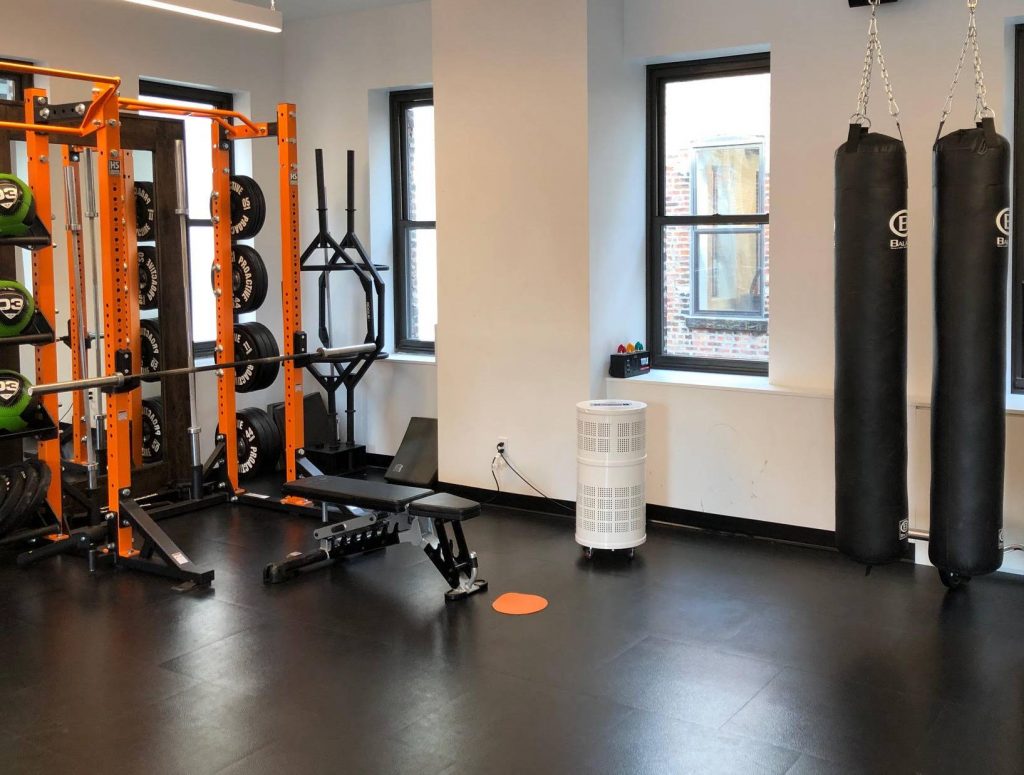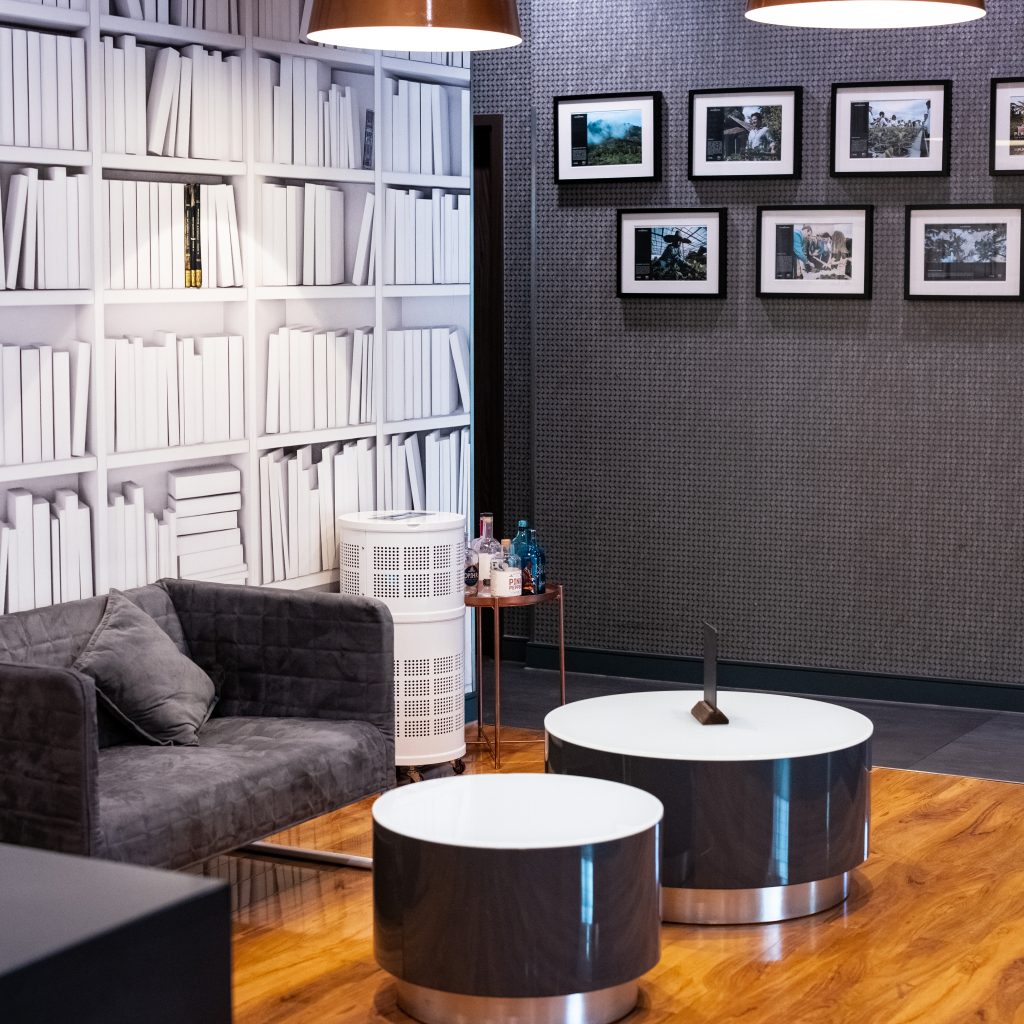Increasing Hotel Capacity and Room Occupancy by Purifying Air to Hospital-grade Standards

Implementing and communicating a stringent policy of eradicating virus and bacteria from the air in a hotel’s premises, combined with both deep cleaning of surfaces and maintenance of safe distancing measures, will reassure potential guests. This will allow for improved reservations as well as a broader utilisation of ancillary hotel facilities on offer, improving the overall experience, as well as generating revenue from all potential sources.
Covid19 Impact on Hotels
Imposed lockdowns and travel bans due to the Covid19 pandemic severely impacted the hotel industry. Global hotel chains reported revenue per available room rates down 75-85% in 2020. There is, however, evidence that a large majority of hotels in China are now open and profitable, whilst US hotels are reopening with improving occupancy levels.
Virus transmission occurs in three ways:
- Fomites. These are objects or materials which are thought to carry infection, such as clothes, utensils, and furniture. It has been generally assumed that Covid19 could be caught by humans who touch surfaces that have been infected by the virus, resulting in widespread policies to clean and disinfect all types of surfaces (e.g., clothes, furniture, floors). Various scientific research papers have raised doubts about how long the virus can live on a surface and whether it can indeed then infect other humans. The WHO now notes that “Despite consistent evidence as to SARS-CoV-2 contamination of surfaces and the survival of the virus on certain surfaces, there are no specific reports which have directly demonstrated fomite transmission”. The US CDC states that “COVID-19 spreads less commonly through contact with contaminated surfaces”. This all suggests that the risk of Covid19 transmission through fomites is low.
2. Droplets. People get infected by directly inhaling into the lung large droplets that infected individuals expel when they cough, sneeze, sing or talk. These large droplets fall immediately to the floor or nearby surface.
The WHO and governments have widely recognised this transmission risk. To prevent contamination through inhaling large infected droplets, the WHO and governments recommend the wearing of masks and for people to keep a “safe distance” apart from each other. The wearing of masks is to prevent infected people exhaling the large droplets as much as for healthy people to not inhale infected droplets. The “safe distance” policy is to ensure that people are not in a range of any falling large infected droplets being emitted by an infected person.
3. Aerosol (or airborne) transmission is similar to droplet transmission, except that the particles of fluid are much smaller, and they can linger in the air for minutes to hours. Until relatively recently (October 2020), the WHO and governments placed very little importance on Covid19 infection from inhaling Covid19 infected aerosols, but after interventions by the scientific community (most publicly in an open letter by 239 scientists), and the publication of various research papers and case studies of potential airborne transmission events, the WHO recognised the risk of Covid19 airborne aerosol transmission. Governments and their health agencies followed suit. (e.g. US CDC and UK through the UK SAGE committee). The WHO and governments (eg UK SAGE committee) now recommend enhanced ventilation, bringing outside air indoors, and where that is not possible, to use effective air purification units.
Recommended government guidelines and solutions
Governmental advice for to mitigate the risks of Covid19 Aerosol transmission has recently improved. They no longer rely on an open window and door policy, but make recommendations about increasing ventilation and using air purification machines.
US CDC: “Consider taking steps to improve ventilation in the building, in consultation with an HVAC professional, based on local environmental conditions. Consider using portable high-efficiency particulate air (HEPA) fan/filtration systems to help enhance air cleaning.”
UK DHSE: “Where your workplace (or parts of it) are poorly ventilated, you will need to improve ventilation in those areas to reduce the risk of airborne transmission. Airing rooms as frequently as you can will help improve ventilation. Local air cleaning and filtration units can be used to reduce airborne transmission where it isn’t possible to maintain adequate ventilation. Filtration systems, high-efficiency (HEPA) filters and ultraviolet-based devices are the most suitable types to use. They should be the correct size for the area they are being used in.”
Clearly governments have identified the risks of aerosol transmission and recommend improving ventilation. Where that is not possible, they recommend to use well designed portable HEPA air filtration units.

Air Purification Solutions for Hotels
Coronavirus transmission risk can be mitigated in Hotels through a combination of implementing a) safe distancing measures b) mask wearing c) effective ventilation or air purification and d) transparent guest communication.
Rensair has worked with hotels to find good air purification solutions. We analyse floor plans and existing ventilation capabilities, understand facility use and traffic to formulate a tailor made solution. Rensair will calculate the correct air purification and air flow change for different rooms and structures:
Lobby area Rensair units can be effectively deployed to change the Lobby air up to 4 times an hour.

Restaurants and Bars A unit in these types of facilities is positioned where there is no client/employee traffic – independent testing shows Rensair units are effective wherever they are placed in a room.
Guest rooms New customers should be assured that the risks of Covid19 airborne transmission in a guest room has been alleviated. They should know that they are entering and staying in a room that has completely sterilised air.
Rensair recommends that after a room has been completely cleaned following the Hotel’s policy, a cleaner then places a Rensair unit in the closed room to purify its air whilst the cleaner moves onto clean the next room. A Rensair unit can purify the air in a guest bedroom in less than 7 minutes (for a 75m3 room). A Rensair unit is extremely portable, lightweight and on wheels, allowing a cleaner to trail a Rensair unit after each room has been cleaned.
Gyms/Studios/Health Spas Rensair units are already purifying air in many health and sports activity centres in the US and Europe. By offering the availability of these facilities, a Hotel can offer guests a better experience during their stay, whilst generating revenues from their use.

Employee Offices: Rensair units have been deployed in office spaces to purify air in the employee workplace. Risks of airborne transmission are seen to be higher in crowded and poorly ventilated spaces, like call centres. Portable air purification units help mitigate the risk of airborne transmission.
Communication Strategy
Covid19 is an invisible threat. Effective communication of air purification should lead to
- Reassured clients who are more likely to make a hotel reservation.
- A higher use of ancillary services (restaurant, bars, gyms etc).
- A better motivated staff who feel safeguarded.
Rensair recommends a two pronged information campaign:
Physical: A physical banner at reception to greet guests on arrival, communicating the Hotel’s air purification policy throughout the hotel. This will reassure customers at the beginning of their stay that their rooms and ancillary facilities are safe. This reassurance could be reinforced by small discreet labels on guest room doors confirming that rooms have been deep cleaned and had their air sterilised, as well as discreet notes in entrances to ancillary facilities.
Online: Advertising of air purification on personal websites and third party re-seller sites. At the same time, constant communication of sanitisation policies via social media.
RENSAIR – The product, maintenance and guarantee.
A Rensair Air Purification unit is small, portable, powerful, and highly effective. Using hospital grade HEPA13 filters and strong fans, it has been independently tested to show that it effectively eradicates 99.97% of airborne viruses (including coronavirus), bacteria, pollen and other airborne pollutants. Rensair air purification systems have been operating in Scandinavian hospitals for more than 10 years and more recently are utilised in the UK’s NHS hospitals and US Care homes, as well as by global multinationals including PepsiCo, Walt Disney, GSK and Anglo American.
Rensair units are simple to service and maintain. Because the internal UVC light eradicates viruses and airborne pollutants on the filter, it is safe for general maintenance staff to replace the HEPA13 filter and UVC light. Rensair offers a full after sales service.
Rensair units are made to the very high quality standards required in the health sector. Rensair offers a one year guarantee should there be any malfunction of the unit.
Long-term use
The trend of air pollution was worsening well before the outbreak of the coronavirus pandemic. For example, asthma affects 1 in 12 children in the US and 1 in 11 in the UK. Businesses and households have become more educated and aware of the subject, requiring better air quality in their personal and business lives.
Rensair offers a long term solution given the reliability of its air purification systems – the oldest unit, which has been serviced according to instructions, is still in operation after 14 years.
Interested in Rensair?
See how it works here or contact our technical team contact@rensair.com

